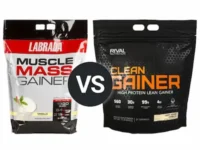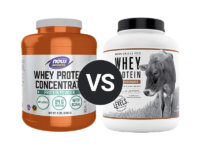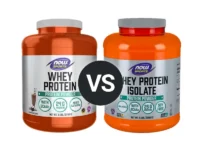Knowledge BaseYou're Questions Answered
What are the differences between budget protein powder and more expensive brands?
When it comes to protein powder, the main differences between budget and more expensive brands can be found in the quality of ingredients, manufacturing processes, and additional features such as added vitamins and minerals.
Budget protein powders may be made with lower-quality ingredients, such as lower-grade protein sources or artificial sweeteners, to keep costs down. These powders may also be processed using lower-quality manufacturing processes, which can affect the taste, texture, and absorption of the protein.
On the other hand, more expensive protein powders may use higher quality ingredients, such as grass-fed whey protein, to provide a more complete amino acid profile and potentially better absorption. These powders may also be processed using more advanced manufacturing techniques to ensure a smoother texture and better mixability.
Another difference between budget and more expensive protein powders is the addition of vitamins, minerals, and other ingredients. Some more expensive brands may include these extra nutrients in their products, which can add to the overall cost.
However, it's important to note that just because a protein powder is more expensive doesn't necessarily mean it's better. Consumers should always check the ingredients list and nutritional information to ensure that the protein powder fits their individual needs and goals.
Overall, budget protein powders can be a cost-effective way to add protein to your diet, but it's important to do your research and choose a brand that fits your individual needs.
- Paddon-Jones, D., & Rasmussen, B. B. (2009). Dietary protein recommendations and the prevention of sarcopenia. Current opinion in clinical nutrition and metabolic care, 12(1), 86-90.
- Phillips, S. M., & Van Loon, L. J. (2011). Dietary protein for athletes: from requirements to optimum adaptation. Journal of sports sciences, 29(sup1), S29-S38.
- Kerksick, C. M., Wilborn, C. D., Roberts, M. D., Smith-Ryan, A., Kleiner, S. M., Jäger, R., ... & Kreider, R. B. (2018). ISSN exercise & sports nutrition review update: research & recommendations. Journal of the International Society of Sports Nutrition, 15(1), 1-57.
- Reidy, P. T., Rasmussen, B. B., & Drummond, M. J. (2016). Protein supplementation: what's new and exciting? Current opinion in clinical nutrition and metabolic care, 19(5), 407-413.
Related Questions
Related Reviews

Your Answer
We are a participant in the Amazon Services LLC Associates Program, an affiliate advertising program designed to provide a means for us to earn fees by linking to Amazon.com and affiliated sites.



